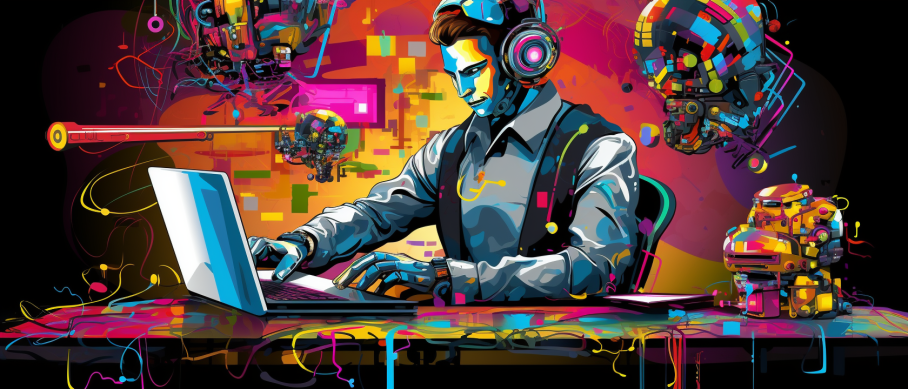Key Takeaways
✅ Robotics is leading to the automation of routine tasks, shifting job roles towards more complex and creative work that requires human intervention and critical thinking.
✅ As robotics integrate into various industries, there is a growing demand for skills in robotics programming, maintenance, and system design, highlighting the need for continuous learning and skill development.
✅ The future of work will see a blend of human-robot collaboration, necessitating the development of interpersonal skills and adaptability among workers to effectively manage and work alongside robotic systems.
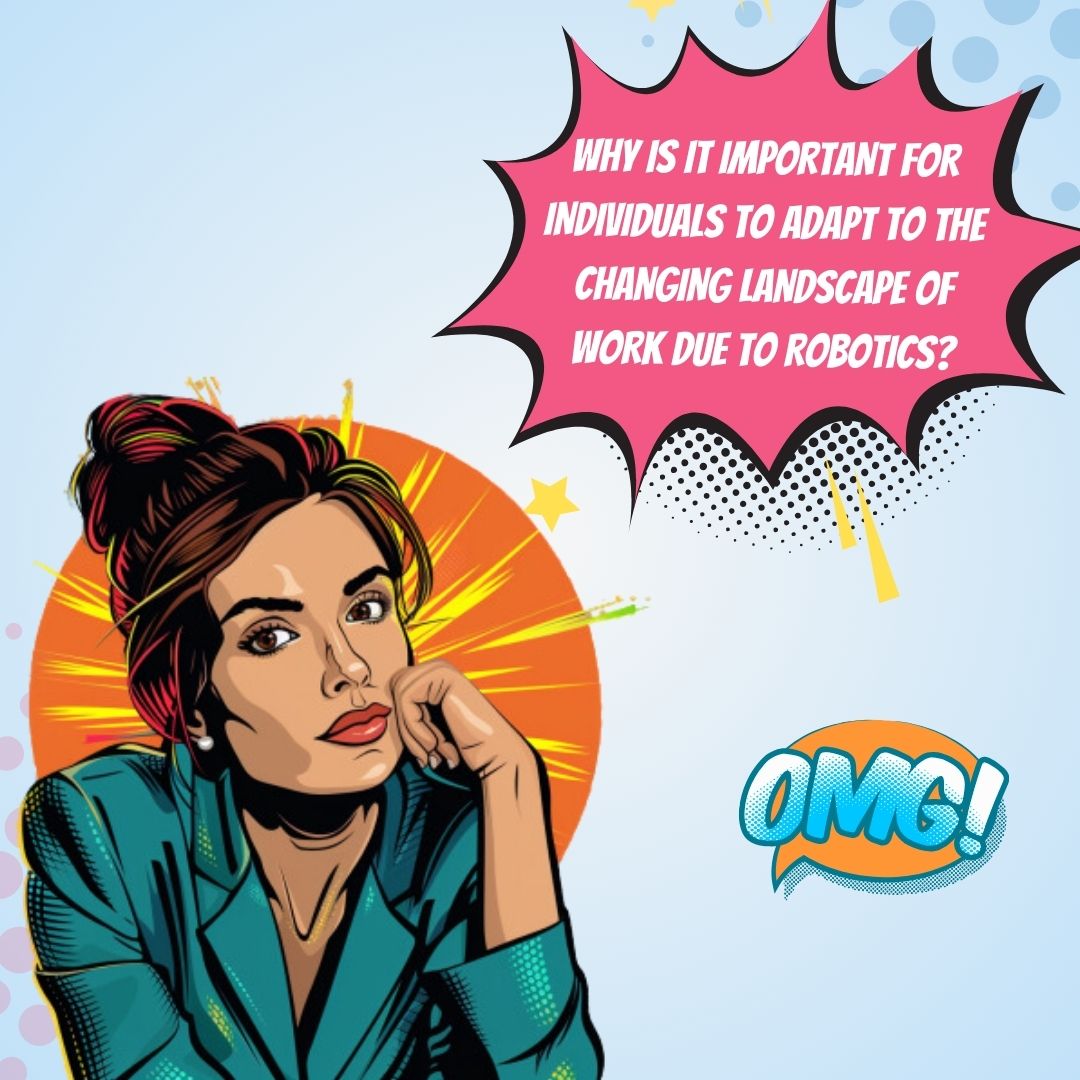
Introduction
Ever wondered how the future of work will look in a world where robots are our colleagues? Imagine clocking into your job only to find that your new partner is made of circuits and sensors, programmed to perform tasks with precision. The reality isn't far off, as robotics is reshaping job roles and skills right before our eyes—a revolution that is both exciting and a bit daunting. Why are these changes happening, and what can you do to stay ahead of the curve?
The rise of robotics and automation isn't just about technology; it's a story of human evolution in the workforce. We're not just talking about machines taking over repetitive tasks; we're looking at a future where creative thinking, emotional intelligence, and adaptability become the main currency in the job market. So, how do you fit into this narrative? What skills will be your ticket to a thriving career in the age of automation?
Join us as we uncover the transformative power of robotics and its impact on your professional life. From the historical context of robots in the workplace to the latest trends in job creation and displacement, we've got you covered. We'll explore the importance of upskilling and reskilling to stay competitive, and highlight how embracing change can be your best strategy in the new era of work.
Whether you're a business owner looking to stay ahead, a professional pondering your next career move, or simply curious about the future, we've got actionable insights and groundbreaking information that could very well redefine your perspective on work, value, and personal growth. Ready to dive in? Let's discover how you can turn the rise of robotics into a ladder for your success, not a hurdle to fear.

Top Statistics
| Statistic | Insight |
|---|---|
| Global Robotics Market Size: Expected to reach $126.3 billion by 2025, with a CAGR of 22.8%. (Source: Research and Markets) | This highlights the rapid growth of the robotics field and indicates a surge in the integration of robots across various sectors. |
| Job Displacement and Creation: Potentially 75 million to 375 million workers globally could be displaced, while new jobs and increased productivity are also expected. (Source: McKinsey Global Institute) | A stark reminder of the dual-edged sword of technology, showing the need for flexible skills and adaptive workforces. |
| Skills in Demand: By 2025, 85 million jobs may be displaced but 97 million new roles are expected to emerge. (Source: World Economic Forum) | New roles are coming, which could mean opportunities for those who are ready to dive into the future with the right skills and enthusiasm. |
| Adoption of Collaborative Robots: Cobots are set to account for 34% of the total robotics market by 2025. (Source: ABI Research) | Shows the growing trend of robots working hand-in-hand with humans, not just replacing them. |
| Industry Forecasts: The healthcare robotics market is projected to grow to $17.5 billion by 2025. (Source: MarketsandMarkets) | Reflects the critical role robotics will play in healthcare, emphasizing the trajectory towards innovative medical services and care. |
The Rise of Robotics and Automation
Have you noticed how robots and smart machines are popping up everywhere? From assembly lines to customer service, they're transforming how work gets done. Historically, the rise of machinery fired up the industrial revolution, changing the face of manual labor. Now, robotics is doing the same but at a pace that's hard to keep up with. Picture a world where drones deliver your packages and robots assist surgeons in complex operations. In fact, industries like manufacturing, logistics, and even healthcare are already feeling this change. There's this mingling sense of excitement and unease, right? It's like we’re standing at the edge of a new frontier, watching robots slot into roles once filled by humans.
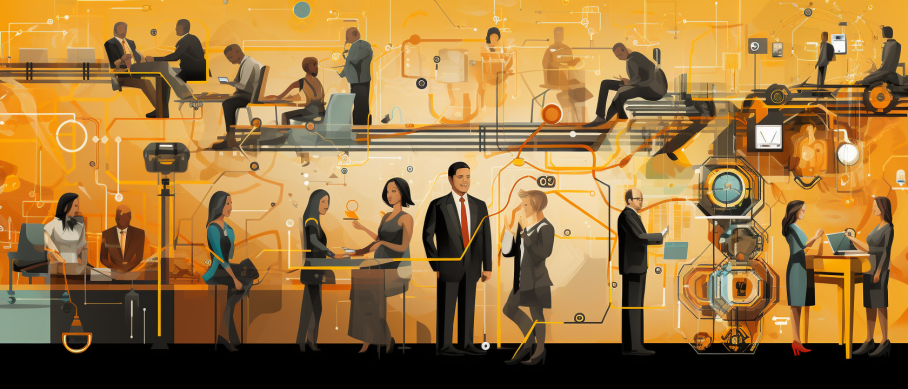
Changing Job Roles and Skills
Speaking of roles, the job you're doing today, do you think a robot could do it tomorrow? There's a whole reshaping of job roles underway thanks to our metallic friends. Some jobs are phasing out, think about cashier roles with the advent of self-service checkouts. But, it's not all doomsday talk; some new opportunities are knocking! There's a growing need for robot specialists, data scientists, and all sorts of positions we didn't dream of a decade ago. It's a bit like a dance, with every step robots take in, we’ve got to shuffle round and find a new spot on the dance floor, polishing up on new skills we never thought we’d need.
Upskilling and Reskilling for the Future
Now, how do we keep pace with this mechanical march? The magic words are upskilling and reskilling. Picture an employee who's been on a factory floor for twenty years; the machines are coming, so it's time to learn some new tricks. Employers are starting to pump resources into training programs, and online courses are everywhere. Think of it as a chance to reinvent yourself, professionally. Maybe you're eyeing the role of a robotic technician or a data analyst? Whichever direction you're leaning, the key takeaway is to embrace learning as a lifelong buddy. Constantly updating your toolkit ensures you're always in demand, no matter how the work landscape shifts.
The Impact of Robotics on the Economy
Let's chew on the economic side of things for a moment. Robots don't just change jobs; they disrupt whole economies. When robots take care of the repetitive tasks, companies can save a dime or two, possibly passing those savings onto consumers. But here's the head-scratcher: what happens when machines do the jobs humans used to get paid for? We're staring down the barrel of a complex equation involving job displacement and job creation. Economists are scratching their heads, trying to figure out if this equation balances out positively in the long run. Will the robots leave us wealthier with more leisure time, or are we looking at widening income gaps?
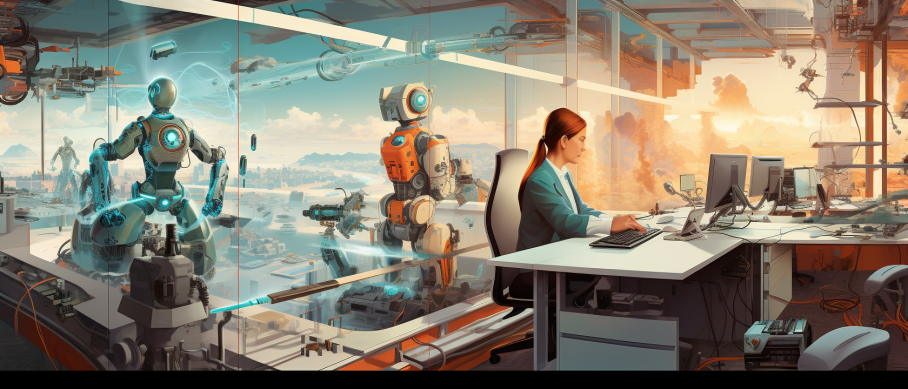
The Human Element
Alright, brace yourself for the big question: Are we humans just… expendable? It's the fear gnawing at the edges of this whole robotics debate. But here's a comforting thought; robots might have brains, but they lack hearts. That's where we come in. The future might be automation-heavy, but it’ll be thirsty for the human touch—that irreplaceable slice of empathy, creativity, and critical thinking. There's this burgeoning field where humans and robots team up, accentuating each other’s strengths. The silver lining? Jobs that bank on emotional intelligence seem pretty robot-proof for now, and your knack for human connection could be your biggest asset in the robotic age.
AI Marketing Engineers Recommendation
Recommendation 1: Invest in Continuous Learning and Skills Development: The Future of Work isn't just coming; it's already here, shaking up job roles right in front of our eyes. Did you know that more than 120 million workers in the world's 12 largest economies may need to be retrained in the next three years as a result of intelligent/AI automation? What does that mean for you and your team? Well, it's time to embrace a culture of continuous learning. Provide resources and time for your employees to upskill and reskill, particularly in areas such as data analysis, AI management, and robotic maintenance that will be vital as robotics continue to integrate into our workflow.
Recommendation 2: Reinvent Job Roles to Include Human-Robot Collaboration: How about seeing robots not as job snatchers, but as our new work buddies? It's happening already. Cobots (collaborative robots) work hand-in-hand with humans in many sectors. You see, successful businesses are those that figure out how to make this partnership thrive. By strategically redesigning job roles to amplify the strengths of both humans and robots, companies can increase efficiency, innovation, and employee satisfaction. Are you thinking of ways workers can team up with robots to achieve more? Imagine a warehouse where humans focus on strategy and problem-solving while robots do the heavy lifting - literally.
Recommendation 3: Leverage Robotics to Enhance Customer Experiences: We often talk about robotics in terms of how they change our jobs, but what about how they can elevate the experience for our customers? If you run a business, this could be a game-changer. Robotics can offer personalized services, consistent quality, and around-the-clock availability. Companies are using chatbots to answer customer inquiries at lightning speed, and AI to provide recommendations that feel incredibly personal. Take Sephora's use of a chatbot that can give beauty advice as if it knows your skin better than you do. So, where can robotics enhance your customer's journey from start to finish? Embrace these tech wonders to make customer interactions smoother, smarter, and simply better.
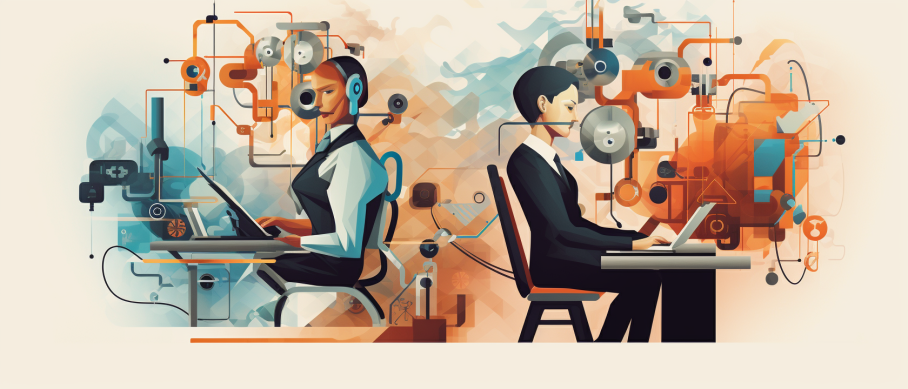
Relevant Links
Maximize Your Affiliate Earnings with This Expert 2024 Guide
Unlock passive income success with advanced affiliate marketing strategies
The Battle of AI Assistants: Free or Premium?
Discover whether you should go free or paid with ChatGPT
Revolutionize Your Content Strategy with AI
Harness the power of ChatGPT for innovative marketing content
The Future-Ready Skill of Prompt Engineering
Master the craft of prompt engineering and direct AI effectively
Boost Your Small Business Growth with ChatGPT
Explore how ChatGPT can catalyze your small business's expansion
Conclusion
So, what's the bottom line when it comes to robots stepping into our work boots? Well, it's not quite a case of "move over, human, R2-D2 needs your desk." Robotics are carving out space in our workplaces, sure, but this isn't the end of the story for us — it's more of a plot twist.
Throughout our chat, we've seen that the rise of robots and automated buddies in different industries is shaking up the game in a big way. Some jobs are winding down the curtains, while others are just getting their opening act. It's not about missing the train; it's about running alongside it and hopping on board, right? That's where upskilling and reskilling come into play. They're not just buzzwords; they're your tickets to staying relevant.
Remember those examples of new job roles popping up? They're the clues to what future chapters might look like. We've peeked into the economic crystal ball and, sure, there are challenges, but opportunities? There's a truckload of them. Economics can be a tricky beast, yet job creation often walks hand in hand with job displacement. It's the dance of progress.
And hey, let's not forget about us – the human beings behind the scenes. Our flair for creativity, our knack for empathy, and our unique human touch aren't going anywhere. In fact, they're becoming even more valuable. It's about embracing a duet with technology where human-robot collaboration highlights the best of both partners.
Wrapping this up, think of the future as an open book with several blank pages waiting for your story. Keep learning, stay adaptable, and be ready to script an amazing journey with our metallic counterparts. Are you going to watch from the sidelines, or are you ready to be part of the narrative that defines the future of work?
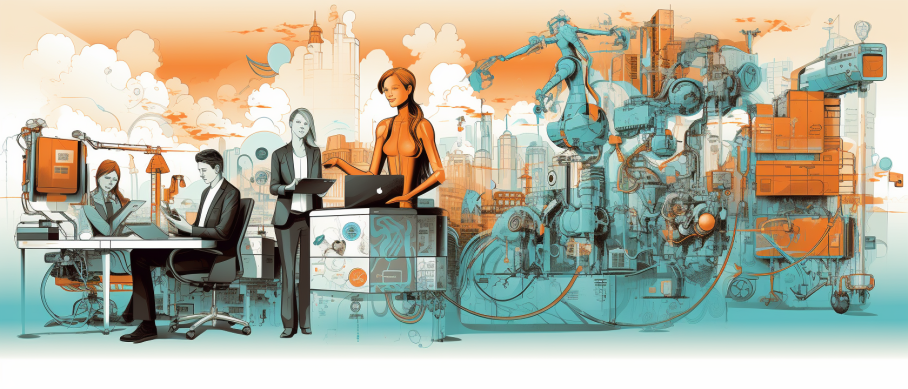
FAQs
Question 1: What is the impact of robotics on job roles and skills?
Answer: Robotics is transforming job roles and skills by automating repetitive tasks, increasing efficiency, and creating new job opportunities in areas such as robotics engineering, maintenance, and data analysis.
Question 2: Will robots replace human workers?
Answer: While robots may replace some jobs, they are more likely to augment human capabilities and create new job opportunities. The future of work will involve a combination of human and robotic collaboration.
Question 3: What skills will be in demand in a robotics-driven workplace?
Answer: In a robotics-driven workplace, skills such as data analysis, programming, robotics engineering, machine learning, and adaptability will be in high demand.
Question 4: How can professionals prepare for a future with more robotics?
Answer: Professionals can prepare for a future with more robotics by staying up-to-date with the latest technological advancements, acquiring new skills through training programs, and embracing lifelong learning.
Question 5: What are the benefits of robotics in the workplace?
Answer: Robotics in the workplace can lead to increased productivity, improved safety, reduced costs, and higher-quality products and services.
Question 6: How can businesses adapt to the changes brought by robotics?
Answer: Businesses can adapt to the changes brought by robotics by investing in employee training, redefining job roles, and developing strategies to leverage the benefits of robotics while minimizing potential negative impacts.
Question 7: What are the potential challenges of implementing robotics in the workplace?
Answer: Potential challenges of implementing robotics in the workplace include the cost of implementation, the need for employee training, concerns about job displacement, and the potential for cybersecurity risks.
Question 8: How can governments and policymakers support the transition to a robotics-driven workplace?
Answer: Governments and policymakers can support the transition to a robotics-driven workplace by investing in education and training programs, promoting research and development, and creating policies that encourage innovation and protect workers.
Question 9: What is the role of artificial intelligence in shaping the future of work?
Answer: Artificial intelligence is a key component of robotics and is shaping the future of work by enabling robots to learn, adapt, and make decisions. AI will play a crucial role in determining the capabilities and impact of robotics in the workplace.
Question 10: What are some examples of industries that are already being transformed by robotics?
Answer: Industries that are already being transformed by robotics include manufacturing, healthcare, transportation, agriculture, and logistics. These industries are seeing increased efficiency, improved safety, and new job opportunities as a result of robotics.
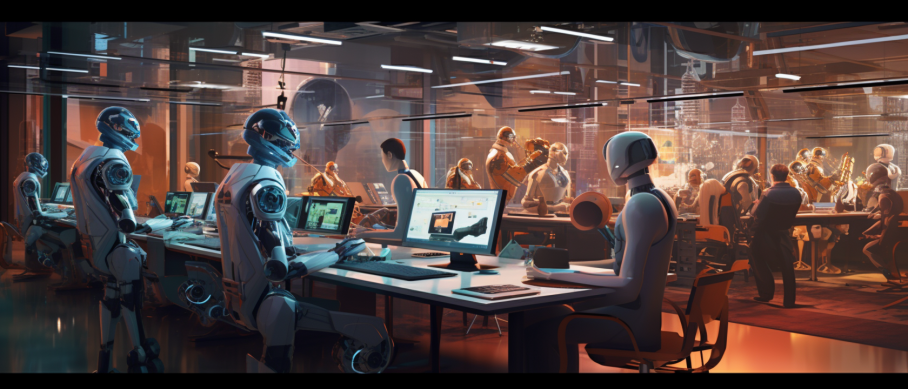
Academic References
- Frey, C. B., & Osborne, M. A. (2013). The Future of Employment: How Susceptible Are Jobs to Computerisation? Oxford Martin School, University of Oxford. This comprehensive study takes a deep look into the potential future where a significant portion of job roles could be automated. Frey and Osborne raise a critical point about the necessity for people to learn new skills to stay ahead in a world where nearly half of current US jobs might be at risk.
- Acemoglu, D., & Restrepo, P. (2017). Robots and Jobs: Evidence from US Labor Markets. National Bureau of Economic Research. This paper dives into the tangible effects that the incorporation of robots has had on the US job market. With each robot that gets added to the workforce, Acemoglu and Restrepo note a slight decrease in employment and wages, which beckons the question: How should society and policy adapt to these changes?
- Broecke, S., Quintini, G., & Vandeweyer, M. (2018). The Future of Work: Occupational Projections and Skills. OECD. The future of work is not just about the jobs that will be lost to machines but also about the skills that will remain valuable and tough to automate. This report suggests an increased need for sharp minds that can wield critical thinking, creativity, and superb social skills.
- Lepak, D., Gajendran, R. S., & Anger, T. (2019). The Impact of Robotics on Employment and Human Resource Development. Human Resource Management Review. Lepak and his colleagues offer a unique perspective on the juxtaposition of robotics in the workplace, suggesting both an optimistic view of new job creation and improved safety, as well as a reminder for companies to prepare and train their employees for a robot-rich future.
- World Economic Forum. (2020). The Future of Jobs Report 2020. This report serves as a clarion call for urgent reskilling, with the projection that half of all employees will need to refresh their skillsets by 2025. It sheds light on the marriage of human and machine and the inevitable push towards public and private entities coming together to smooth out the transition.

